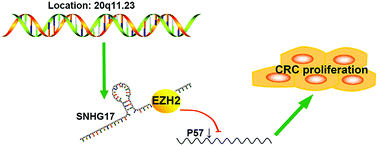Long non-coding RNA SNHG17 is an unfavourable prognostic factor and promotes cell proliferation by epigenetically silencing P57 in colorectal cancer
Abstract
Recently, substantial evidence has demonstrated that long non-coding RNAs (lncRNAs) play critical roles in multiple cancers including colorectal cancer (CRC). Utilizing publicly available lncRNA-expression-profiling data from the Gene Expression Omnibus (GEO) dataset GSE21510, we screened SNHG17 as a new candidate lncRNA associated with CRC development and progression. We further demonstrated that SNHG17 was upregulated in CRC tissues, and that its overexpression was significantly correlated with tumor size, TNM stage, and lymph node metastasis in CRC patients. Moreover, SNHG17 knockdown significantly inhibited the proliferation of CRC cells, and induced cell cycle G1/G0 phase arrest and cell apoptosis. Consistent with these findings, SNHG17 silencing inhibited tumor growth in vivo. Mechanistic studies revealed the capability of lncRNA SNHG17 to epigenetically suppress P57 by binding to enhancer of zeste homolog 2 (a key component of polycomb repressive complex 2) in CRC cells, and quantitative real-time polymerase chain reaction assays demonstrated that SNHG17 expression levels were inversely correlated with those of P57 in CRC tissues. Furthermore, rescue experiments confirmed that SNHG17 exerted oncogenic functions partly through regulating P57 expression. These findings represent the first reporting of the roles and mechanisms associated with SNHG17 in CRC progression, highlighting SNHG17 as a potential therapeutic target for CRC patients.



 Please wait while we load your content...
Please wait while we load your content...